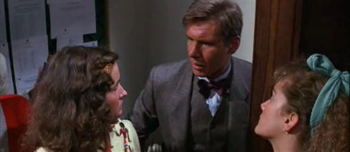Paul Krugman writes about how FDR's caution in doling out economic stimulus in the mid-30s nearly undid the whole recovery from the Great Depression:
After winning a smashing election victory in 1936, the Roosevelt administration cut spending and raised taxes, precipitating an economic relapse that drove the unemployment rate back into double digits and led to a major defeat in the 1938 midterm elections.
What saved the economy, and the New Deal, was the enormous public works project known as World War II, which finally provided a fiscal stimulus adequate to the economy’s needs.
In his blog, Krugman breaks it down:
Nearly every forecast now says that, in the absence of strong policy action, real GDP will fall far below potential output in the near future. In normal times, that would be a reason to cut interest rates. But interest rates can’t be cut in any meaningful sense. Fiscal policy is the only game in town.
Wait, there’s more. Ben Bernanke can’t push on a string – but he can pull, if necessary. Suppose fiscal policy ends up being too expansionary, so that real GDP “wants” to come in 2 percent above potential. In that case the Fed can tighten a bit, and no harm is done. But if fiscal policy is too contractionary, and real GDP comes in below potential, there’s no potential monetary offset. That means that fiscal policy should take risks in the direction of boldness.
After some sophisticated back-of-the-envelope calculations, Krugman comes up with a number of $600 billion. Short story is, if you go big early, you can squash it out -- if it works, you can always scale it back.
At WHYY's Y Decide, the
great Dan Pohlig trumps Krugman's WWII-as-public-works gag for an even better take on the problem:
I wonder if there’s an analogy from recent history that even our conservative friends would agree with. Since I can’t think of one, maybe I’ll make one up.
Let’s say you overthrow a horrible dictator because you claim that he had something to do with an attack on your country. So that part goes pretty easily but then you find yourself with this pernicious and deadly insurgency because you forgot that rebuilding a country and providing security is far more difficult and resource intensive as blowing up a bunch of stuff and capturing one lone ex-dictator (which it turns out, is far easier than capturing one lone nomadic terrorist). So you send a few troops over but you find that things continue to get worse. Every time you stop one bit of the insurgency, it just retreats and attacks a different part of the country where your forces aren’t located. Your troops are dying. The people who live in the country are dying. Infrastructure is being blown up just as quickly as it’s built.
So you decide, this little bit of time tactic just isn’t working and you decide to send a whole BUNCH of troops over at one time to stop all of the insurgents everywhere at once. You could call it the “WAVE” or the “SWELLING” or maybe the “SURGE.” After a few months, you find that by throwing a huge amount of resources over a short period of time, you can stop the insurgency for just enough time to let that nation’s own army come into line. With things stabilizing, you can pull all of your troops out and call it Mission Accomplished… or something.
I'll go Dan one better, and make the hawkish liberal argument for both Iraq and the stimulus. The problem with the timing of the "surge," in both Iraq and (potentially) the economy, is that only by going big
early can you really get a handle on the thing. Try to do it on the cheap, thinking you might be able to scale things up later, and you'll waste more blood and treasure (natch) putting out fires than you would spend in the first place by doing it right.
So we need to gather up our allies, get consensus, and do this thing with overwhelming force. We need to follow the Powell Doctrine for economic intervention.
Two quick notes. First -- why not Paul Krugman for Secretary of the Treasury? He hasn't always been kind to Obama, but not only is the dude awesome and liberal, he is a great communicator to the people, which is what we're going to need to get big-time buy-in from the American people for the big plans he'd want to support. Also, in case you hadn't heard, P-Krug just won the Nobel Prize.
Second -- a possible benefit of the gov't bailout of banks is that numbers in the hundreds of billions suddenly become feasible for economic projects in a way that they weren't even a year ago. You can say $600 billion for economic stimulus and not sound like you're overshooting it. You can push for universal health care, and the price tag doesn't seem overwhelming.
But we're also threatened by the fact that the bailout/stimulus becomes the default way we handle these problems. For instance, the Big Three's health care and pension plans are collapsing, a disaster that was bound to happen, and one which many commentators have said for years might create the political will for a move towards universal/socialized health care. But instead, it's happening while all this other mess is going on, so instead of changing the health care system, the Big Three will probably get some kind of gov't bailout, and still cut health care and pensions to retirees.
That is six kinds of suck. I'm with Dan and Paul and the gang. Obama should go big, long, and do the thing up right.


